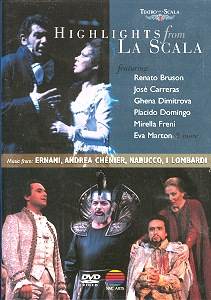|

BUY NOW
AmazonUK
|
Highlights from La Scala
Giuseppe VERDI (1813-1901)
Ernani. Opera in four acts (1843)
Libretto by Francesco Maria Piave based on Victor Hugo’s play Hernani.
First performed at the Teatro la Fenice, Venice, 9 March 1843
 Ernani, the bandit,
Placido Domingo (ten); Don Carlo, King of Spain, Renato Bruson (bar);
Don Ruy de Silva, a Spanish grandee, Nicolai Ghiaurov (bass); Elvira,
Mirella Freni (sop) Ernani, the bandit,
Placido Domingo (ten); Don Carlo, King of Spain, Renato Bruson (bar);
Don Ruy de Silva, a Spanish grandee, Nicolai Ghiaurov (bass); Elvira,
Mirella Freni (sop)
Orchestra
and Chorus of the Teatro alla Scala, Milan/Riccardo Muti
Directed
by Luca Ronconi.
rec.
live, December 1982
Nabucco. Opera in four parts (1842)
Originally known as Nabucadonosor after the play from which Temistocle
Solera derived the libretto
First performed at La Scala, Milan, 9 March 1842
Nabucco, King of Babylon, Renato Bruson (bar); Zaccaria, High Priest of
the Hebrews, Paata Burchuladze (bass); Abigaille, slave, believed to be
the eldest daughter of Nabucco, Ghena Dimitrova (sop); Fenena, daughter
of Nabucco, Raquel Pierotti (sop); Ismaele, Hebrew in love with Fenena,
Bruno Beccaria (ten);
Orchestra
and Chorus of the Teatro alla Scala, Milan/Riccardo Muti
Directed by Roberto de Simone.
rec. live December 1986
I Lombardi. Opera in four acts (1843)
Libretto by Temistocle Solera derived from Tomasso Grossi’s epic poem
I Lombardi alla prima crociata
First performed at La Scala, Milan, 1 February 1843
Griselda,
Ghena Dimitrova (sop); Oronte, son of the tyrant of Antioch, José Carrerras (ten);
Pagano, Silvano Carroli (bar)
Orchestra
and Chorus of the Teatro alla Scala, Milan/Gianandrea Gavazenni
Directed by Gabriele Lavia.
rec. live April 1984
Umberto GIORDANO (1867-1948)
Andrea Chénier - Historical dramatic opera in
four acts (1896)
Libretto by Luigi Illica
First performed La Scala, Milan, 28 March 1896
Andrea Chenier, poet, José Carreras (ten); Carlo Gérard, former servant
in the Coigny household and also in love with Maddalena, Piero CappuccIlli
(bar); Maddalena, in love with Chenier, Eva Marton (sop)
Orchestra
and Chorus of the Teatro alla Scala, Milan/Riccardo Chailly
Directed by Lamberto Puggelli.
rec. live, July 1985
Picture format: NTSC 4:3.Colour. Linear – PCM stereo.
Subtitles in English, German, Spanish, French, Portuguese and Japanese
 WARNER MUSIC VISION
DVD VIDEO 50-51011-2323-2-9 WARNER MUSIC VISION
DVD VIDEO 50-51011-2323-2-9  [59:00]
[59:00]
|
Error processing SSI file
|

